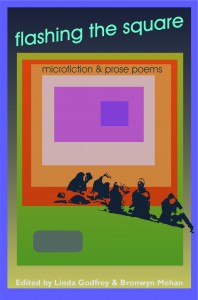 In the first of our interview series with contributors to Flashing the Square, an anthology of microfiction and prose poems, we interview Berkeley-based Australian author, Kirsten Tranter.
In the first of our interview series with contributors to Flashing the Square, an anthology of microfiction and prose poems, we interview Berkeley-based Australian author, Kirsten Tranter.
1. What inspired you to write the prose poem/microfiction which will appear in Flashing the Square?
Turing Test Study Guide was inspired by thinking about the Turing Test, which is designed as a measure of artificial intelligence. To pass the Turing Test, an entity has to convince a human judge that it is human, or more specifically to make it impossible for the judge to tell the difference between the computer and another person, who also takes part in the test. There are no set questions or correct answers, although it is fun to t hink about what they might be, and in another piece I’ve come up with some. It’s basically a conversation that takes place through a written interface.
hink about what they might be, and in another piece I’ve come up with some. It’s basically a conversation that takes place through a written interface.
The Turing Test was proposed by Alan Turing, the brilliant code-breaker and early computer scientist. At the time I wrote Turing Test Study Guide I had just re-read one of my favourite novels, The Diamond Age by Neal Stephenson, which is kind of obsessed with Alan Turing and the idea of machine intelligence, and how that might be encoded in a digital, empathic book. I’d also just joined facebook and was coming to terms with the codified forms of emotional expression in that digital social media world, and reflecting on the compression of the status update or the tweet, which can go in the direction of poetic intensity and/or banality. Battlestar Galactica was on TV at the time, as well, with all its wonderful, paranoid reflections on the relationship between humans and machines. It made me think about Bladerunner and the pathos of the humanoid machine that doesn’t know it is a machine.
The Turing Test raises really interesting questions for me about what it means to be human, and what distinctions can be said to exist between human and machine being. I started to think about what might it mean to study for the test, like one studies for a normal exam – to study up on acting human.
2.Tell us about your process. (Do you start sparse and widen out, or do you write down every possible association and cut back? Do you research the subject matter you are writing about? Is it pure intuition?) Take us through an example if you want.
I’d describe my piece as a prose poem rather than a microfiction, because it is more interested in the loose association of ideas and images that for me, in my own work, distinguishes poetry from fiction, which is driven by a different narrative energy. But in some ways the process for writing both is similar, in that both involve tuning in to a part of the mind that is close to the unconscious, the mysterious language of dreams. Part of the process is to close down the analytic part of the mind– or if not close it down, at least diminish its power – and trust that the answer, the connections, the peculiar logic that relates one image or word or idea to another will be revealed in the process of writing, not preconceived or fully understood before the act of writing. I’m usually pretty skeptical about this kind of opposition between reason and intuition, imagination and analysis, but that is the best way to describe how it works. Because I’m trained as a literary critic I have to work maybe harder than other people to calm down the analytic part of my brain. Then I revise, a lot. Revising mostly involves cutting. Poems take literally months and years to settle into their proper shapes.
3. What advice do you have for other writers? (About the first or last line? About how to choose the title? Do you follow any rules?)
In my experience, rules are destructive to the writing process, although I get quite a lot of pleasure out of reading other writers’ ‘rules for writers’, seeing them not as rules but as ideas to experiment with. I guess my advice is to be patient with your own imagination and don’t ask it to explain itself too quickly. And read widely.
4. Who or what inspires your writing?
Other writing. The desire to make emotional sense of the chaos of life through language.
5. Tell us what you do if you haven’t written anything in a while and you want to get started writing again? Could you share your favourite writing exercise with our readers?
I don’t use any particular prompts myself but I have a couple of favourites that I teach with: One is any kind of a variation on John Gardner’s classic prompt, ‘Describe a lake as seen by someone who has just committed a murder. Don’t mention the murder.’ This brilliant exercise shows everything you need to know about how description, point of view, narrative and character are not separate things but intimately entwined.
Muriel Spark has some wonderful advice about writing that I turn to when I get stuck with my fiction writing, which for me is almost always an issue of voice. In her novel A Far Cry From Kensington, she recommends writing as though you are ‘writing a letter to a friend’ – real or imagined, but a close friend, ‘without fear or timidity, right to the end of the letter, as if it was never going to be published.’ She says not to rehearse too much before you start, just to have a general idea of the story you want to tell.
Kirsten Tranter is the author of the novels A Common Loss and The Legacy, and a co-founder of the Stella Prize. She grew up in Sydney and now lives in the San Francisco Bay Area.
